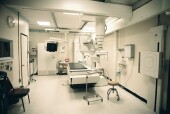
WEDNESDAY, July 31 (HealthDay News) — Adjusting certain ventilator settings on patients during abdominal surgery — known as lung-protective ventilation — results in significantly fewer serious pulmonary complications after the surgery, new research suggests.
French scientists split 400 patients into two groups who received either standard mechanical ventilation during abdominal surgery or lung-protective ventilation, which is used among many patients in the intensive-care unit. Among other measures, it lowers the volume of air inhaled and exhaled during respiration.
Patients in the lung-protection group experienced nearly two-thirds fewer major complications such as pneumonia or acute respiratory failure within a week after surgery.
“Previous studies have suggested that use of a lung-protective ventilation strategy might be beneficial in patients with healthy lungs, which is the case in most patients undergoing general anesthesia for surgery, and even for short periods of ventilation,” said study author Dr. Emmanuel Futier, an assistant professor of anesthesiology at Estaing Teaching Hospital, at the University of Clermont-Ferrand.
“Thus,” he said, “even we were not overoptimistic before the beginning of this study, [since] there were clear positive signs in that direction.”
The study is published Aug. 1 in the New England Journal of Medicine.
More than 230 million people worldwide undergo major surgery each year that requires general anesthesia and mechanical ventilation, according to the study authors. Previous research has indicated that 20 percent to 30 percent of them are at intermediate to high risk for lung complications after surgery. Those at increased risk include patients with a history of respiratory illness, pre-operative sepsis and those undergoing prolonged or major surgery, Futier said.
Identifying patients at higher risk of postsurgical lung complications is crucial, Futier said, since these complications may lead to higher death rates and also increase the length of a patient’s hospital stay.
Standard or nonprotective mechanical ventilation typically uses high “tidal volumes,” forcing air in and out of the lungs at a high volume. But this practice can injure the lungs in several ways, including by triggering the release of inflammatory cells that can damage other organs. Lung-protective ventilation — used with fewer than 20 percent of patients in routine anesthetic practice — lowers tidal volumes along with the air pressure in the lungs.
All patients in the new study were considered at intermediate or high risk of pulmonary complications after major abdominal surgery. Futier and his colleagues found that 10.5 percent of patients receiving lung-protective ventilation experienced major complications such as pneumonia, acute respiratory failure, sepsis or death, compared with 27.5 percent of patients assigned to nonprotective ventilation.
Additionally, only 5 percent of patients on lung-protective ventilation required breathing assistance or intubation for acute respiratory failure within a week after surgery, compared with 17 percent from the nonprotective ventilation group. Hospital stays also were shorter among those in the lung-protective ventilation set.
Futier said the benefits of a lung-protection ventilation strategy outweigh rare and easily avoidable negative effects, and the strategy doesn’t cost any more than standard ventilation.
This “only implies a shift in thinking in the way to set ventilator parameters,” he said. “There is no extra cost to surgery.”
Dr. Richard Lazzaro, chief of thoracic surgery at Lenox Hill Hospital in New York City, called the new study “a great outcomes paper” and said lung-protective ventilation measures are already routinely used in the United States during chest surgeries.
“Clearly there’s a benefit to it,” Lazzaro said. “It’s not routinely used in major abdominal surgery, but this certainly wakes you up to the thought that this should be a consideration.”
More information
The University of Virginia Health System has more about mechanical ventilation.
Copyright © 2026 HealthDay. All rights reserved.

